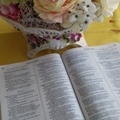[This is one in a series of devotional reflections prepared for Horley Baptist Church during April 2022]
This thought was triggered by a brief e-conversation about the timing of Easter.
Conventionally, Easter is celebrated on the first Sunday after the first full moon on or after 21 March[1]; this date corresponds to the March equinox. However, two different calendars are used in identifying Easter day itself; one calendar was established by Julius Caesar in 46BC and the other by pope Gregory XIII in 1582. The difference between the Julian and Gregorian calendars means that Easter can be celebrated on two different dates.
Neither is wrong, they are just different, and to understand why we need to know a bit of church history.
In broad terms, Christianity has three principal branches: Orthodox, Catholic and Protestant. Historically, they evolved in that sequence, with the Orthodox church claiming a direct line of succession from the Apostles themselves. Orthodox churches predominate in eastern Europe and parts of Africa; as with most denominations they are also present in other parts of the world. Many sections of the Orthodox church continue to use the Julian calendar for ecclesiastical purposes.
The Roman Catholic church takes its leadership from a pope in Rome. It claims the apostle Peter as its first pope and retains a high degree of control in the areas of liturgy and church practice. Its adherents are global but predominate in southern Europe and South America. The Roman Catholic church follows the Gregorian calendar.
In the 16th century, movements within the Catholic church started to question the supremacy of the pope as well as certain practices that were seen as inconsistent with Biblical teaching. This lead to the formation of protestantism, which was often violently opposed by those loyal to the Catholic church. In due course, the diversity of beliefs within the protestant community led to the establishment of many separate denominations, each with their own understanding of Scripture and their own preferred form of worship. In general, Protestant communities continue to follow the Gregorian calendar.
Of course, as Baptists, we would claim that our way of worship is derived from our understanding of the New Testament churches as described in the books of Acts, Revelation and the various epistles. For us it is largely a matter of convenience that we follow the local ecclesiastical calendar and celebrate Easter accordingly.
Does our claim to New Testament authenticity give us a valid reason for dismissing the liturgy and practices of those who are of a different persuasion?
And other sheep I have which are not of this fold; them also I must bring, and they will hear My voice; and there will be one flock and one shepherd. John 10 v16 [NIVUK]
There have been many attempts to define what Jesus meant when he said those words. Some argue for a narrow definition, others for a wider scope. Either way, the activities of Easter are more important than their date. The death and resurrection of Jesus Christ allow us to look forward to the date when we will be no longer wrong and no longer different.
.[1] https://en.wikipedia.org/wiki/Date_of_Easter.
Bible quotations: Unless otherwise specified, quotations are taken from the resources of Bible Gateway or Bible Hub, in accordance with the licencing conditions outlined on our Site Policies page.
Bible dates:
Where appropriate, the dates given for Biblical events are based on the Bible Timeline resource
and are subject to the constraints defined on the corresponding webpage.
 Horley Baptist Church online
Horley Baptist Church onlineHBC main site
Confidential prayer link
Link to Recent Reflections
Link to Index of Bible Passages
Contributed by Steve Humphreys; © Steve Humphreys

Steve – I have just sent an e-mail to Angela about your parents (could she forward it to you?). I so appreciated their Christian fellowship. I hope to be there on Tuesday.
Thanks again for another stimulating message.